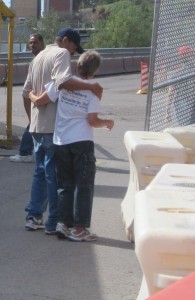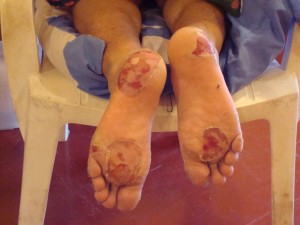OK, I’ll admit it. I read the headlines of the Arizona Daily Star, and hear about the violence and lawlessness in Mexico, and it gives me pause. Nogales has had its share of shoot-outs and drug-related violence. But hey, Tucson isn’t exactly immune to insane violent outbursts. Jan. 8, 2011 is forever seared in my brain as the Safeway massacre. Gabrielle Giffords, my heroine, shot down shaking hands with her constituents, was practicing the most sacred of democratic principles. She was talking to the people. She was looking the people in the eye. So I keep my head up and pay attention to what’s going on when I hike that mile across the border to the comedor. I remember Gabby.
A few weeks ago, our group parked on the US side in a mini-market parking lot for the usual potty break. There were about 5 Border Patrol guys hanging out in the parking lot. They looked at us, I looked at them. My little group had our Samaritan t-shirts on, so it was no secret what we were up to. But, seeing five Border Patrol guys in one spot is pretty unusual. So I figure my taxes are paying for these guys. Don’t be intimidated. I walk over asking if there is any “trouble on the other side of the border?” They laugh and say, “no, we’re just slackers taking too long a break.” One guy grins and says, “if there was trouble, we’d be the last to know…”
They want to chat it up a bit with me.
Then one guy asks—“Are you the folks who leave water in the desert for the lost illegals?” I take a deep breath expecting some sort of verbal confrontation, and say, “Yep, that’s us.” And I add, “Since the Wallow Fire, we were ordered out of the National Forests because of the fire danger, so we haven’t been able to do our water drops.”
And here’s the kicker—the Border Patrol guy says, “We really miss you—we’ve been pulling people out of the desert right and left. We appreciate your help with saving people lost out there. No one can survive these temperatures.”
Wow—I was stunned. We are actually on the same side. So I screw up my courage and say: “We appreciate what you do too….as long as you catch the bad guys and not the good guys.”
One guy smiles and says, “Well, we do the best we can.”
And I can’t ask for more than that.




Recent Comments